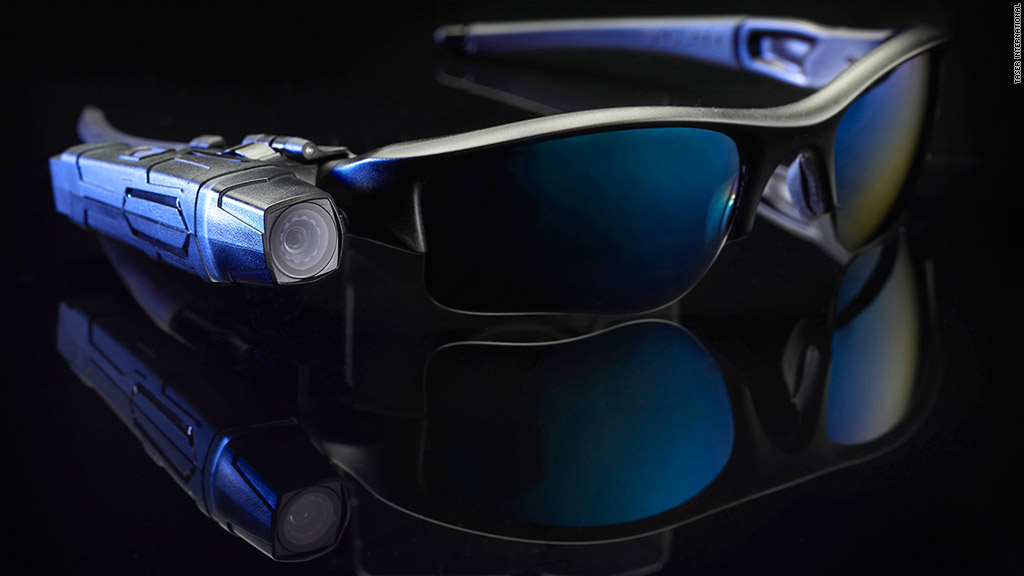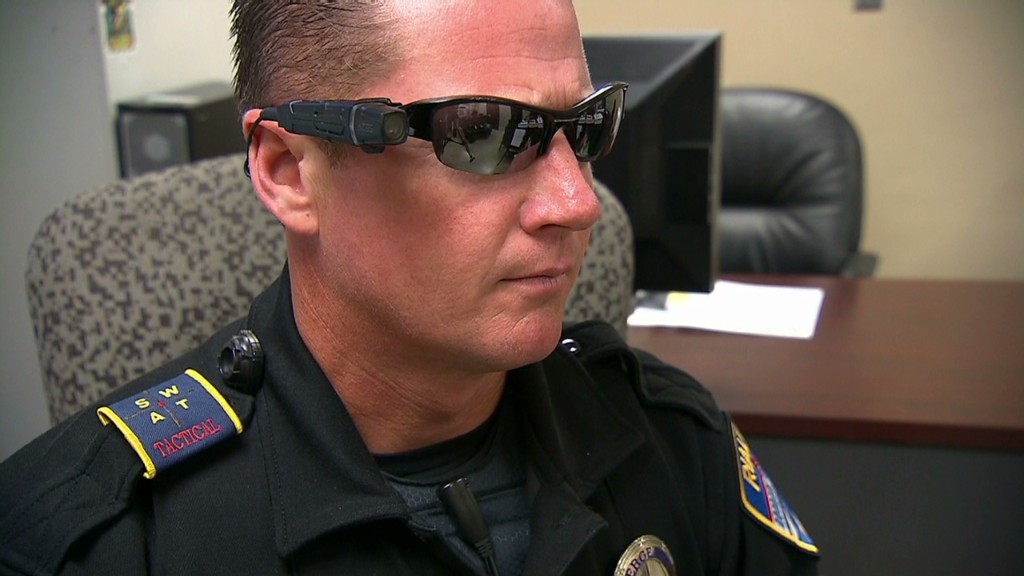
Who watches the watchers? It's an age-old question, but police across the country may have a new answer.
The Los Angeles Police Department is currently testing body-mounted cameras that record officers' interactions with citizens. The New York Police Department says it's reviewing the technology.
These police departments, representing the country's two largest cities, are part of a nationwide trend that could fundamentally change the relationship between police officers and the public.
"It's groundbreaking, it's starting to build up some steam, and I think it's truly the wave of the future," said Tony Farrar, the chief of police for Rialto, Calif.
Rialto, with a population of 100,000 and a police force of 115 officers, began experimenting with wearable cameras in 2012. The results, Farrar says, were stunning: a plunge in incidents involving use of force, from 60 in 2011 to 25 the following year. Complaints from citizens dropped from 28 to three, with just four in the past twelve months.
Related: Robots are taking over corporate America
Farrar says he's received inquiries about the program from other departments as far away as Brazil, Japan and the United Kingdom. Dozens of forces in the United States have followed Rialto's lead, with cameras in use in cities including Fort Worth, Texas; Salt Lake City; and Charlotte.
The benefits of the cameras, supporters say, are twofold: They aid in evidence-gathering at the scene of a crime, and they create a record of officers' behavior, providing a check on unnecessary force and abuses of power.
But the cameras also raise major privacy concerns. Without the right legal frameworks in place, the recordings leave open the possibility of abuse.

A law pending in Pennsylvania that would authorize police use of wearable cameras has drawn opposition from the American Civil Liberties Union, which says it "places too much power in the hands of officers and not enough in the hands of the public."
The ACLU is worried that the bill doesn't include guidelines on when or how citizens can access footage of themselves. The law also doesn't have rules for how long the video can be stored. There's no guidance on when officers are required turn their cameras on and off, putting that power at the discretion of individual cops.
Related: Drones that fight fires
This issue surfaced in Oakland, Calif., in 2011, when several police officers were accused of violating department rules by keeping their cameras turned off during a confrontation with protesters.
Oakland PD spokeswoman Johnna Watson said the department had disciplined officers for not recording their encounters with citizens. All 593 officers on patrol in the city have wearable cameras, the largest deployment in the country so far.
Oakland requires officers to record all self-initiated activity with citizens, and keeps the footage on file for five years. Earlier this year, prosecutors in the city introduced crime-scene footage in a case involving the murder of an eight-year-old girl, the first use of evidence from wearable cameras in a courtroom, Watson said.
"Any time you have anything new like this technology, you're always looking for ways to improve," Watson said. "These are dynamic conversations that are taking place in law enforcement organizations not just in our country, but internationally."
With the proper legal framework in place, the ACLU agrees that wearable cameras "can be an effective tool to provide accountability to all persons involved in a police encounter."
Donna Lieberman, executive director of the ACLU's New York City branch, said the cameras could be particularly important in the Big Apple, where trust between police and citizens in many predominantly black and Latino communities has been eroded by the department's controversial "Stop and Frisk" policy. A judge ordered the NYPD to look into wearable camera technology in a decision last year that ruled the policy unconstitutional.
In Rialto, Farrar said, cops are required to turn on their cameras in any confrontation with a suspect or citizen. The footage is uploaded to computers when they return to the station, and is typically retained for one to three months.
"This truly is a tool that helps law enforcement increase the level of legitimacy in policing," Farrar said.
Carlos Miller agrees. The Miami-based journalist runs the website Photography Is Not A Crime, and has been arrested several times while attempting to document the actions of police officers.
"A lot of times, cops abuse their power and twist the truth," Miller said. "If there are more cameras, we hope that keeps them more honest."

